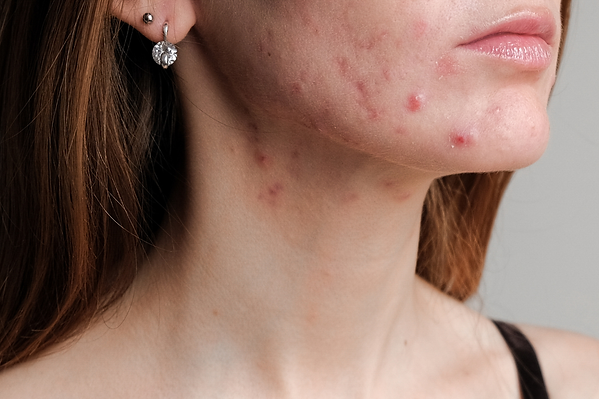Acne & Blemish Prone Skin

CONCERN
Acne or blemish prone skin
TREATMENT OPTIONS
• Topical Creams
• Skin Care
• Chemical Peels
RESULTS
From 12 Weeks
What causes acne?
Acne is a common skin condition that occurs when hair follicles become clogged with oil, dead skin cells and bacteria. Acne typically affects teenagers however it is not uncommon for adults to experience acne too.
Spots may sometimes be referred to as comedones and are categorised as either open or closed. Open comedones, also known as blackheads, are small bumps with dark centers where the clogged pore is open at the surface. Closed comedones, also known as whiteheads, are small bumps with a white or flesh-colored surface where the clogged pore is closed. Several factors contribute to the development of acne:
-
Excess oil production: The sebaceous glands in the skin produce an oily substance called sebum. In some individuals, these glands can become overactive, leading to an excessive production of sebum. This can result in clogged pores and the formation of acne lesions.
-
Clogged pores: When the sebaceous glands produce too much sebum, it can mix with dead skin cells and block the hair follicles. This creates an environment where bacteria can thrive, leading to inflammation and the formation of acne.
-
Bacteria: Propionibacterium acnes (P. acnes) is a type of bacteria that naturally lives on the skin. When the hair follicles become clogged, P. acnes can multiply and contribute to the development of acne by causing inflammation.
-
Hormonal factors: Hormonal changes, such as during adolescence, pregnancy or the menopause play a significant role in acne development. Hormones like androgens increase oil production and can lead to the enlargement of sebaceous glands, making individuals more prone to acne.
-
Diet: While the relationship between diet and acne is still being studied, some research suggests that certain foods, such as high-glycemic-index foods (e.g., sugary and processed foods) and dairy products, may worsen acne in some individuals.
-
Environmental factors: Exposure to certain environmental factors, such as pollutants and high humidity, can contribute to the development of acne by clogging the pores or irritating the skin.
How can acne be treated?
At Coral Aesthetics we have a variety of treatments to treat acne and blemish prone skin. We recognise that every person is unique - and so is their skin. The causes of acne need to be identified and the best approach is usually holistic and involves a combination of treatments.
Working closely with dermatologists and as a qualified Nurse Prescriber, Nurse Coral is able to prescribe a variety of treatment options including topical retinoids, tretinoin and in-clinic skin treatments. Treatment for acne scarring is also available.

Not sure which treatment will get you the best results? Why not book in for a complimentary video or face to face consultation with Nurse Coral to discuss the options available to you today



